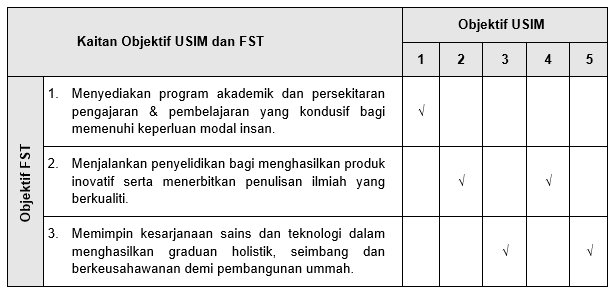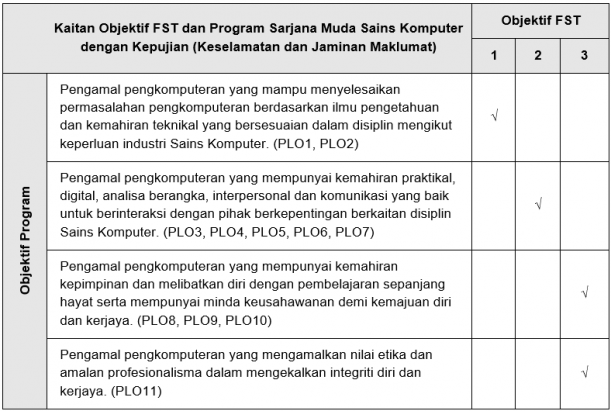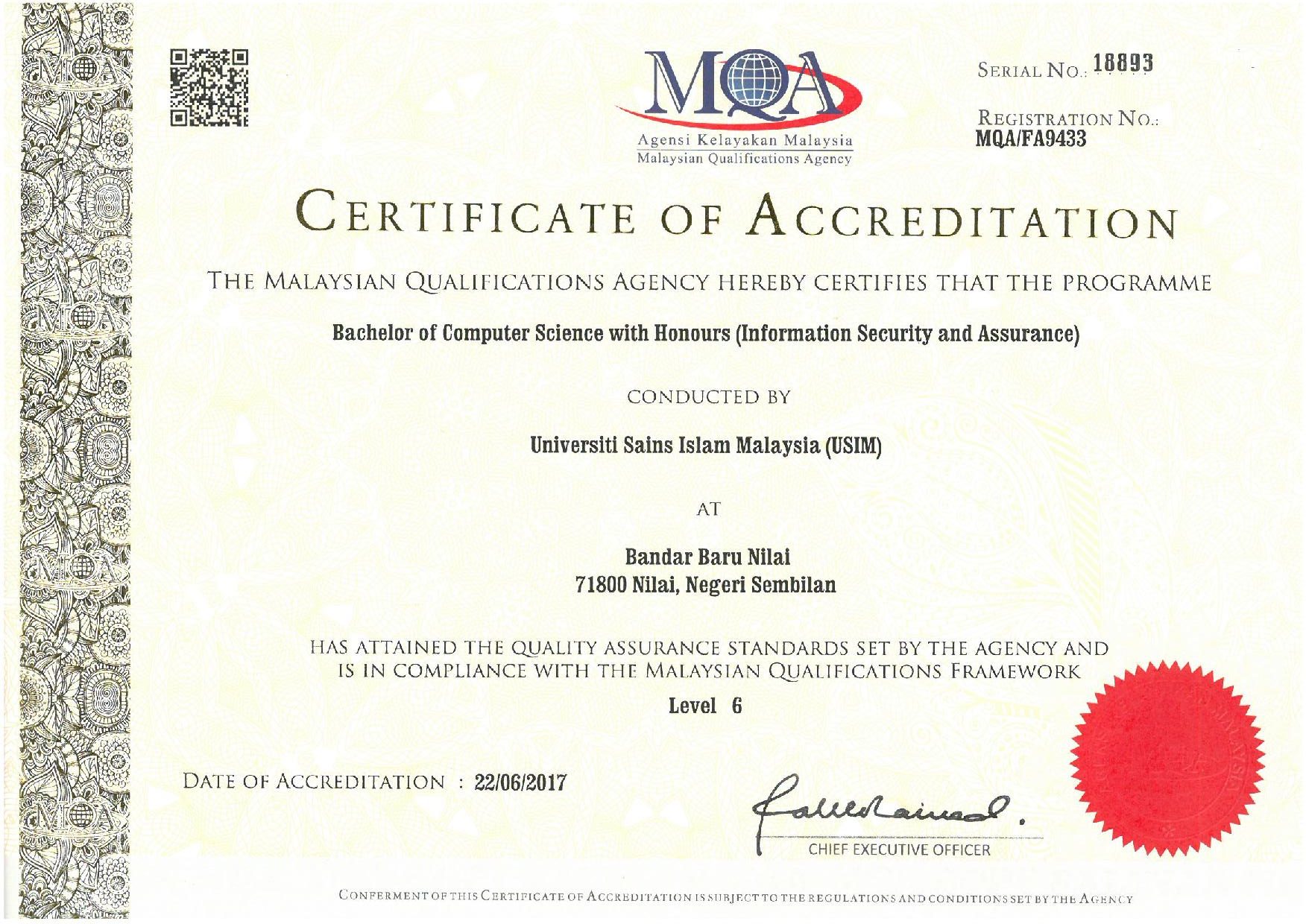Computer science is a field that needs to be developed to improve knowledge and information technology in social education and development. The benefit is to accelerate the accumulation, processing and analysis and dissemination of information can be done efficiently and accurately. This will have a significant impact on the techno-socio-economic development and stability of the country, especially in the face of competition through international manufacturing and trade industries and globalization. Unfortunately, intrusion in the computer industry seems to be a common phenomenon faced by the organization. Hence, computers and information security assurance are essential to all government, private and individual organizations.
MQF1.0
Program Educational Objectives (PEO)
The Information Security and Assurance programme will produce a Computer Scientist Practitioner who:
PEO1: able to apply knowledge, principle, and skills in Computer Science to solve the problem critically in line with Islamic principles for ummah development, country and global world progress. (LO1, LO6).
PEO2: proficient in mathematics, scientific skills, and knowledge computing theory for analyse, modelling, design, develop and evaluate computing solutions through an understanding of theory and practical of Computer Science. (LO2)
PEO3: able to communicate, lead, work in teams and have social awareness, ethical in Islamic Syariah. (LO3, LO4, LO5).
PEO4: capable to develop career and research through the exploration of business opportunities through life-long learning for Ummah development.(LO7, LO8)
Program Learning Outcome (PLO)
PLO1: to obtain and apply knowledge through concept, principle and theory that related to Computer Science particularly in Information Security and Assurance (LO1).
PLO2: identify problem, analyse, design and implement solutions through computer programming. (LO2)
PLO3: demonstrate skills and social responsibilities. (LO3)
PLO4: practice ethical values, professionalism and good humanity based on integration of Naqli and Aqli knowledge. (LO4)
PLO5: communicate, lead and teamwork effectively. (LO5)
PLO6: apply scientific reasoning in critical problem solving. (LO6)
PLO7: obtain and disseminate ICT information and get engaged in life-long learning and information management.
PLO8: apply management and entrepreneurship skills. (LO8)
MQF2.0
Program Educational Objectives (PEO)
The Information Security and Assurance programme will produce a Computer Scientist Practitioner who:
PEO1: able to apply knowledge, principle, and skills in Computer Science to solve the problem critically in line with Islamic principles for ummah development, country and global world progress. (LO1, LO2).
PEO2: proficient in mathematics, scientific skills, and knowledge computing theory for analyse, modelling, design, develop and evaluate computing solutions through an understanding of theory and practical of Computer Science. (LO3, LO6, LO7)
PEO3: able to communicate, lead, work in teams and have social awareness, ethical in Islamic Syariah. (LO4, LO5, LO8, LO11).
PEO4: capable to develop career and research through the exploration of business opportunities through life-long learning for Ummah development. (LO9, LO10)
Program Learning Outcome (PLO)
PLO1: to obtain and apply knowledge through concept, principle and theory that related to Computer Science particularly in Information Security and Assurance (LO1).
PLO2: identify problem, analyse, design and implement solutions through computer programming. (LO2)
PLO3: demonstrate skills in Computer Science field. (LO3)
PLO4: capable to work together as a team and adapt to different environments and cultures.
PLO5: has the ability to convey information orally or in writing effectively.
PLO6: capable to use digital technology to obtain information resources.
PLO7: capable to relate scientific data and numerical analysis
PLO8: have a leadership attitude and social accountability to make decisions in a team.
PLO9: obtain and disseminate scientific information related to ICT as well as practice the concept of lifelong learning.
PLO10: have entrepreneurial skills and be able to find opportunities and start a business plan.
PLO11: demonstrate awareness and practice good ethical values, professionalism and humanity based on the integration of Naqli and Aqli knowledge.

Jadual Kaitan Objektif FST dan Program Sarjana Muda Sains Komputer dengan Kepujian (Keselamatan dan Jaminan Maklumat)

Objektif USIM
- Memartabatkan pendidikan Islam serta membawanya ke dalam arus perdana pendidikan negara.
- Membina kesepaduan antara teori dan amali dalam diri setiap siswazah yang dikeluarkan.
- Melahirkan ilmuan Islam yang berpendidikan sepadu, mampu memimpin masyarakat majmuk serta mempunyai potensi yang tinggi menerajui pembangunan negara.
- Meneroka dan mengembalikan tradisi keilmuan Islam yang unggul bersesuaian dengan persekitaran dan teknologi terkini.
- Membekalkan modal insan yang kukuh dengan penghayatan nilai Islam yang mampu berinteraksi dan berkomunikasi dengan berkesan dalam masyarakat.
Objektif Fakulti (FST)
- Menyediakan program akademik dan persekitaran pengajaran & pembelajaran yang kondusif bagi memenuhi keperluan modal insan.
- Menjalankan penyelidikan bagi menghasilkan produk inovatif serta menerbitkan penulisan ilmiah yang berkualiti.
- Memimpin kesarjanaan sains dan teknologi dalam menghasilkan graduan holistik, seimbang dan berkeusahawanan demi pembangunan ummah.
Graduates in this field can participate in the communications, multimedia, telecommunications, finance, banking, security, fund, trust fund, takaful, insurance, management, trade, computer fabrication, software, information technology, consulting, mining, transportation (land, sea and air). In addition, they can also be entrepreneurs, franchisors or working in the public sector.
